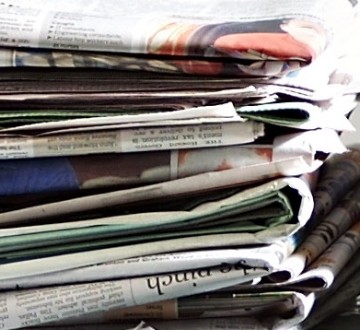10 Examples Why News Media is in Chaos
Saturday, June 15, 2013

The transformation of media from newspaper and 6 pm news to digital platforms, Twitter aggregation, moms on Facebook -- and the impact of mobile viewing -- has been significant.
Take a look at the big deals, big layoffs and new research that shows that the consumer's behavior is moving faster than marketers may understand.
Game Changes For Print, Broadcast
The state of media, which has seen major shifts in ownership, employment, readership, and sponsorship in recent months, saw more shake-ups this week, when Gannett, the owners of USA Today as well as major local papers, purchased Belo Corp., the separate broadcast arm from A.H. Belo's Corporation's newspaper group, who counts among its publications the The Providence Journal.
With talks of staff buyouts at the Wall Street Journal, the Washington Post putting up a new reader paywall, and a report by Business Insider this week that Patch.com has been a "bad investment" for AOL since its acquisition, GoLocal spoke with media experts Michael Scully at Roger Williams University in Bristol, RI as well as Dan Kennedy at Northeastern University's School of Journalism in Boston, MA, to get the experts' take of what's happening in the world of media right now -- and what's at stake.
Slideshow: See Ten Examples of Why Media is in Chaos -- Below

"It is indeed interesting that Gannett opted for the television side of things with Belo," said Kennedy. "As far newspapers go, the the talks of buyouts at the Wall Street Journal...since it was bought my [Rupert] Murdoch, who loves newspapers, mind you -- it hasn't been immune to cuts."
"Since Murdoch's empire was split in two, the paper division has had to stand on its own. It's not being held up by Fox [entertainment]," explained Kennedy.
"However, print legacy is where newspapers make most of their money still," Kennedy continued. "People have been predicting the switch to simply a weekend model now, but that really hasn't happened."
"Look at the New Orleans Time Picayune. They scaled back print operations, and after seeing the results, they're switching the model back to daily print," said Kennedy.
Regarding Patch, Kennedy said that the "top-down" approach, with AOL's acquisition and management of the company, would never work -- and that it is the "bottom's up" model that is poised to succeed in digital media.
"The hyper-local model can absolutely work," said Kennedy. "It has to be thought grassroots driven, from someone who is pushing the model up and out, not vice-versa."
Scully Banking on Digital

"Fast, accurately, and electronically," said Scully. "That's where media is prominently now, and will continue to move."
Scully proposed that news was going to become increasingly consumer driven. "It's going to be like iTunes," he said. "People aren't going to buy the whole album, i.e. the pre-packaged unit mirrored in a newspaper, or a magazine."
"They're going to buy a song -- or article -- they like, and then buy another from someone else and so on," explained Scully.
In the meantime, Scully saw among media groups a continued consolidation -- and rationalization -- of services. "What we're starting to see are economies of scale. What Gannett has done with newspapers, they'll do on the broadcast side, which is to say shutting down local copy desks and opting for regional coverage."
"There's a "four screen" theory," explained Scully. "TV, computers, smart phones/tablets (i.e. iPads), and Google Glasses. The winner in media is going to be who can control the smart phones."
Related Articles
- Bob Lobel: How We Brand Ourselves in the Media
- College Admissions: How Social Media Can Ruin Your Application
- BIA/Kelsey Names GoLocal24 Future Star in Local Digital Media




 Delivered Free Every
Delivered Free Every
Follow us on Pinterest Google + Facebook Twitter See It Read It